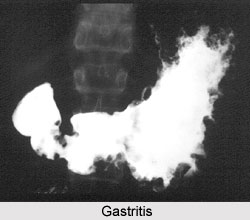 Gastritis is one of the most common stomach related disorders found. There are several types of gastritis, out of which, Acute Gastritis and Chronic Gastritis are considered common. Apart from these two types, there are also several other types of gastritis that include Duodenitis, Chronic erosive gastritis, Chronic non-erosive gastritis, Metaplasia, etc. Sometimes, the types of gastritis are defined as Type A gastritis, Type B gastritis, Type C gastritis, etc. as well. Different types of gastritis are caused for different reasons and they also show different signs and symptoms. Identifying the exact kind of gastritis helps a lot in choosing the right treatment method for the disease.
Gastritis is one of the most common stomach related disorders found. There are several types of gastritis, out of which, Acute Gastritis and Chronic Gastritis are considered common. Apart from these two types, there are also several other types of gastritis that include Duodenitis, Chronic erosive gastritis, Chronic non-erosive gastritis, Metaplasia, etc. Sometimes, the types of gastritis are defined as Type A gastritis, Type B gastritis, Type C gastritis, etc. as well. Different types of gastritis are caused for different reasons and they also show different signs and symptoms. Identifying the exact kind of gastritis helps a lot in choosing the right treatment method for the disease.
Acute Gastritis is considered one of the most common types of gastritis. This is a painful inflammation of the lining of the stomach that occurs suddenly and may also involve bleeding of the stomach mucosa. The bleeding is primarily caused due to damage to the tissue caused by the acid found in stomachs. The bleeding normally lasts for less than 24 hours. The principal cause of acute gastritis is the Helicobacter pylori bacteria, which accounts for 90% cases. This type of gastritis may also result from eating spoiled food, dead fish or animals, bones, plastic, wood, chemicals, drugs, or toxic plants, etc. Viral infection is also considered a possible cause.
Chronic gastritis, on the other hand, is more often found in older people. Chronic gastritis involves long-term inflammation of the mucosal lining of the stomach and this inflammatory condition of the upper digestive system can last for years. Among numerous possible causes, the Helicobacter pylori bacteria are found to be the primary reason. In case of chronic gastritis, the sphincter above the stomach fails to do the job properly and as a result the acid goes up the oesophagus. This results in pain in the chest as the acid dissolves the esophagus walls. There are two major types of chronic gastritis known as Chronic Erosive Gastritis and Chronic Non-erosive Gastritis.
Erosive Gastritis is actually gastric mucosal erosion caused due to the damage of mucosal defenses. Though alcohol consumption does not cause chronic gastritis, it does erode the gastric mucosa and low doses of alcohol can stimulate hydrochloric acid secretion. If a person takes nonsteroidal anti-inflammatory drugs (also known as NSAIDs) for a long period, it can increase the chances of the formation of peptic ulcers. This can eventually lead to gastritis. The common symptoms of chronic erosive gastritis include stomach lining lesions, damage to the stomach lining, abdominal pain, weight loss, etc.
Non-Erosive Gastritis usually refers to a variety of histologic abnormalities that are mainly the result of Helicobacter pylori infection. In case of non-erosive gastritis, the body accidentally targets the stomach as a foreign protein or infection. It makes antibodies against it and, thus, severely damages or even destroys the stomach and/or its lining. As a result, bile that is normally sent to the small intestine to aid in digestion enters the stomach and ultimately leads to chronic gastritis.
The acute stress gastritis is another common type of gastritis that mainly results from severe illness or injury. This is most commonly found among patients in intensive care units, especially among those with respiratory failure, sepsis (infection in the blood), kidney failure, severe burns, peritonitis or neurologic trauma. These problems usually do not directly affect the stomach.
Atrophic Gastritis is a chronic form in which the gastric mucosa becomes very thin (atrophy) and most of the cells that produce digestive acids and enzymes are lost. This type of gastritis usually occurs due to an autoimmune problem in which antibodies attack the body`s own tissues (autoantibodies). It may also sometimes be caused by infections or following a partial gastrectomy (surgical removal of part of the stomach). Eosinophilic gastritis and plasma cell gastritis are two extremely rare types of gastritis. In these cases, specific types of white blood cells (eosinophils or plasma cells) build up in the wall of the stomach. Though its main cause is not known, it is thought that it could be caused due to an allergic reaction. These types of gastritis are usually chronic.
Apart from the above mentioned types of gastritis, there are also a few other types that are not found commonly but can cause severe damages. These types include the collagen gastritis, Crohn`s disease, Menetrier`s disease, Barrett`s oesophagus, etc. If the exact type of gastritis is identified at an early stage, then this disease can easily be treated. However, it may cause severe complications if not treated in time.




